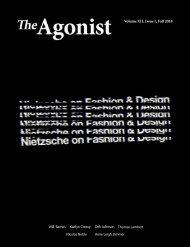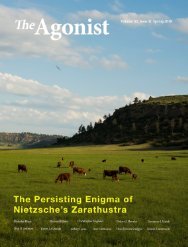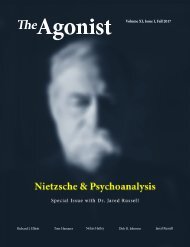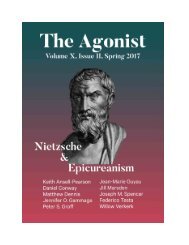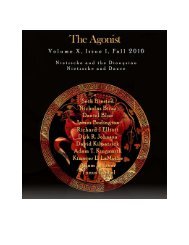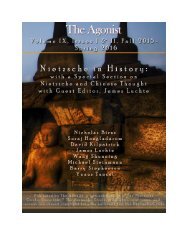Volume XII, Issue II, Spring 2019
You also want an ePaper? Increase the reach of your titles
YUMPU automatically turns print PDFs into web optimized ePapers that Google loves.
THE AGONIST<br />
Nietzsche’s greatest fear. His entire philosophy is a demonstration of the futility<br />
of such a fear, but also a warning. It is not just that the meaning of life is called<br />
into question, but that meaning is determined by the quality of the life lived, the<br />
determination of one’s wasted opportunities. If meaning is use, meaninglessness<br />
is only attributed to the useless, to the wasted ones, to the discarded, to those<br />
who misuse and throw away what is of immense value. Further recall Zarathustra<br />
who asked the sun how it could be happy without those for who it shined. Like<br />
Columbus, must we colonize the universe so as to not squander our lives? Is it up to<br />
us, individually and collectively, to redeem the earth?<br />
Book V of Daybreak is an extended treatment of the death of man. The first<br />
scene imagines a great silence. “Here is the sea, here we can forget the city [my<br />
emphasis]. The bells are noisily ringing the angelus – it is the time for that sad and<br />
foolish yet sweet noise, sounded at the crossroads of day and night – but it will<br />
last only for a minute!” (181). Notice the repetition: nature alongside, and<br />
overshadowing, civilization. Further recall the clever animals who only last a<br />
minute. “Now all is still! The sea lies there pale and glittering, it cannot speak…<br />
O sea, O evening! You are evil instructors! You teach man to cease being man! [my<br />
emphasis] Shall we surrender to you?” (ibid). Humans and their cities will one day<br />
become like the sea: silent. The death of God dismisses human exceptionalism.<br />
Our godlessness reveals our animality. But most importantly, undermining<br />
human idolatry reveals our lives as the accidental product of expansive, timeless,<br />
majestic natural forces.<br />
Nietzsche deems our cultural habits destructive weeds. To save the world a<br />
transvaluation of values, ecological, economic, familial, sexual, social, political,<br />
etc., is necessitated. But we do not know whether we are at the end of history or<br />
the beginning of something else entirely. “[W]e live an existence which is either a<br />
prelude or a postlude, and the best we can do in this interregnum is to… found<br />
experimental states. We are experiments: let us also want to be them!” (190). The<br />
unknowability of humanity’s fate frees us to do anything, to radically experiment<br />
and transform ourselves, individually or collectively. With the death of God, we<br />
are taught, everything is now possible. We must create new values that empower<br />
our passions and vigor for life. In preferring death to happiness, we should rather<br />
collectively perish than return to pre-social, pre-scientific forms of existence. In a<br />
remarkable passage, one which captures the essence of the entire book and<br />
extended meditation on species-extinction, Nietzsche resolves that mankind end<br />
on its feet and defiant, not with head bowed and acquiescent. “This is the main<br />
question. Do we wish [mankind’s] end to be in fire and light, or in the sands?”<br />
(184).<br />
12



